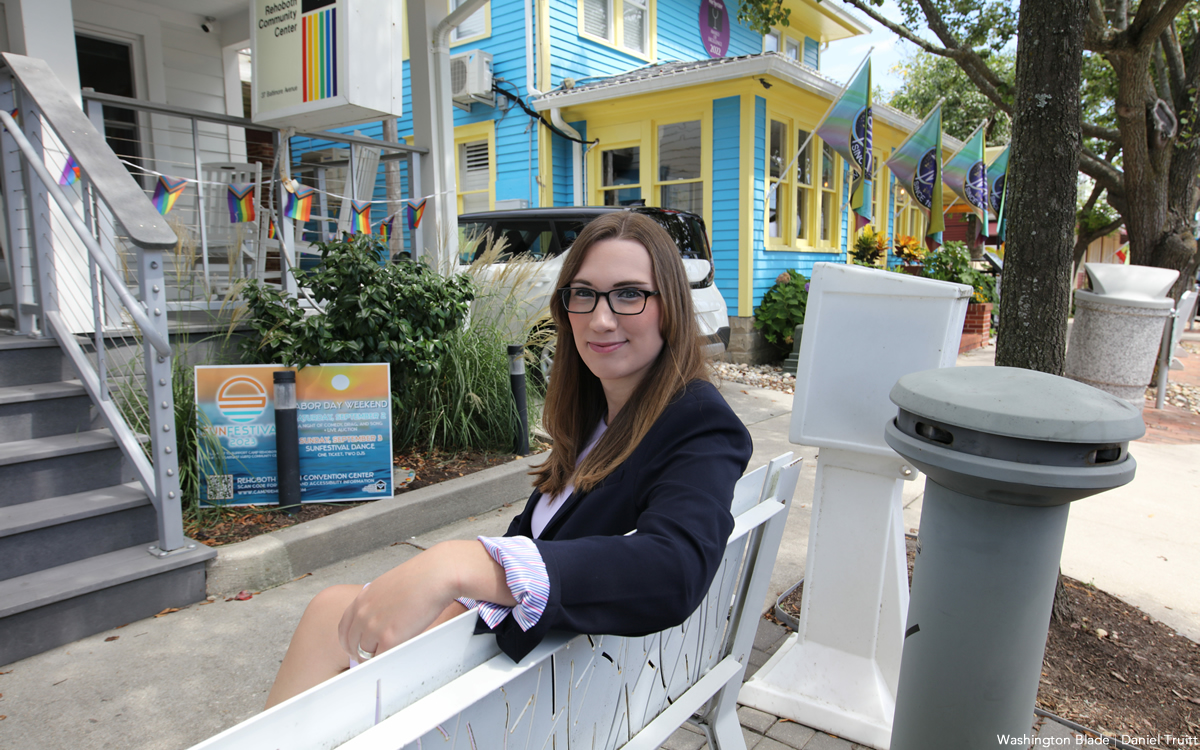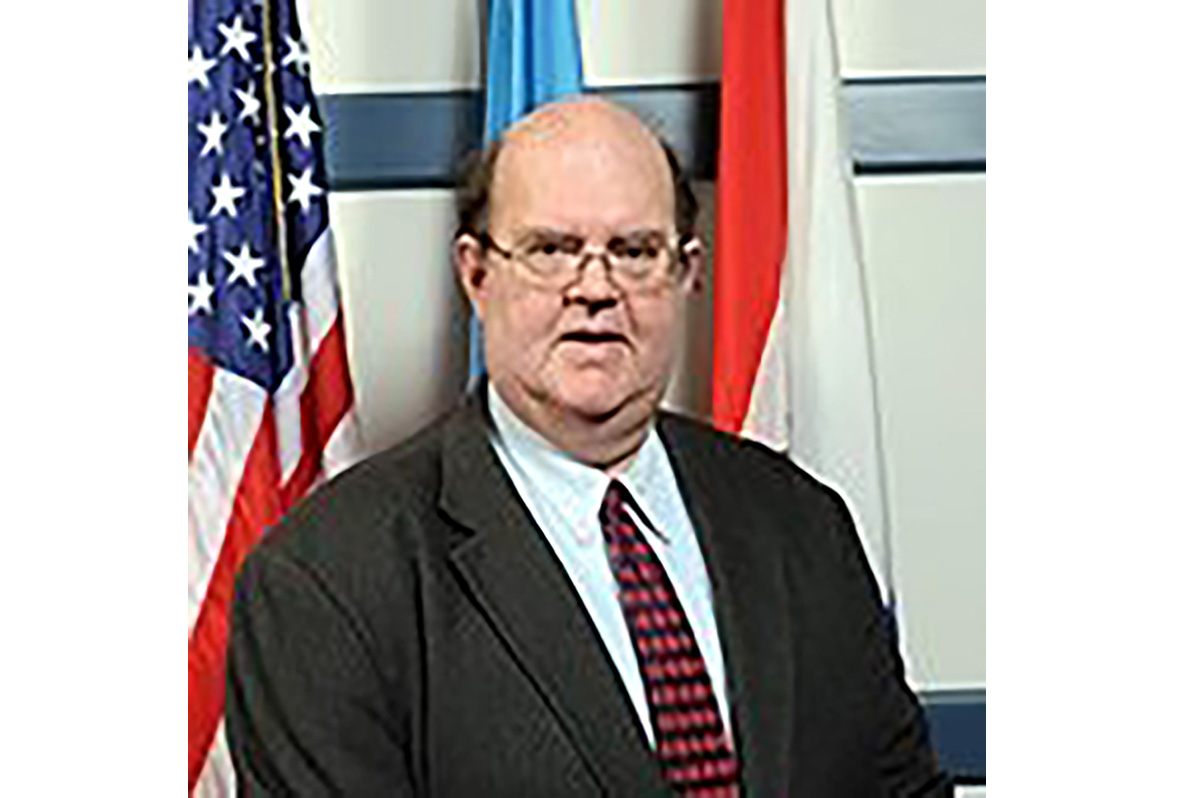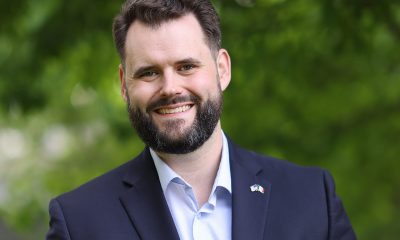Delaware
Sarah McBride ‘not running to be the trans representative in Congress’
Delaware politico on agriculture, climate change, and making history

Sarah McBride is running for Delaware’s sole seat in the U.S. House of Representatives. If you ask her what the most important issues are for voters, she’ll tick off several things: The cost of education, prescription drugs, housing, fear of gun violence, fear of the Supreme Court, the wave of anti-LGBTQ legislation across the nation.
What’s not among them? Her gender identity – the fact that she’s transgender. But we journalists mention it at every turn – you’d be forgiven for wondering whether we know anything else about her. Even at MSNBC, the cozy cable home for liberals, her identity takes center stage.
“Sarah McBride campaigns to be first openly transgender member of Congress,” the lower third blares during McBride’s July 15 MSNBC interview.
“McBride on historic run for Congress,” another says.
“McBride would be the first transgender member of Congress if elected,” a third reads.
And every time her interviewer mentions it, she notes something along the lines of what she told MSNBC anchor Katie Phang: “I’m not running to be the transgender representative in Congress, I’m running to serve Delaware and to make progress on all the issues that matter.”
It begins to resemble a tango – only where the two dancers are dancing to two completely different songs. If it annoys her, she won’t say so publicly.
“Of course there’s going to be discussion about the potential of this campaign to break this barrier and to increase diversity in Congress and to ensure that a voice that has been totally absent from the halls of Congress is finally there in an elected capacity,” McBride says in a recent interview with the Blade. “While it’s not what this campaign is focused on, while it’s not what voters are focused on, it is certainly relevant to the young people who are feeling alone and scared right now.”
She’s running in a crowded primary against rising Delaware political star Eugene Young and former Delaware State Treasurer Colleen Davis. Curtis Morris Aiken and Alexander Nevin Geise, a Universal Life Church minister, have also filed to run, but neither has a campaign website. The primary is slated for April 2, 2024.
McBride, though, has a unique advantage – national name recognition and a close relationship with the Democratic Party’s elite, including President Joe Biden. She formed that relationship working to get Beau Biden, the president’s son, elected as Delaware’s attorney general in 2010 while studying at American University.
McBride continued to work in politics afterwards, later becoming the university’s student body president. In the last few days of her tenure in 2012, she announced something big: She is a woman, she is transgender. The announcement made waves in local and national media. Beau Biden called her to tell her he was proud of her. And then Joe Biden told her he was proud as well when she took a picture with him.
“Hey, kid, I just wanted to let you know I am so proud of you, and Beau is so proud of you, and Jill is so proud of you,” Biden, then the country’s vice president, told McBride. “And I’m so happy that you’re happy.”
Some years later, after pressing for legislation protecting trans Delawareans from discrimination, she got the chance to speak at the Democratic National Convention. Her 2016 speech paid tribute to her late husband, endorsed Democratic presidential candidate Hillary Clinton, and advocated for a better tomorrow. It moved some in the thousands-strong crowd to tears – and others to their feet.
“My name is Sarah McBride and I am a proud transgender American,” she told the crowd, beaming.

Four years later in 2020, she became the highest-ranking transgender person in the country in her role as a Delaware state Senator representing parts of Wilmington. A year later, President Biden appointed her to the Democratic National Committee’s Executive Committee. Her deep entrenchment in politics is reflected in her fundraising: As of the last filing period, July 15, she had already raised more than $400,000. Her opponents haven’t had to open their books yet, so we can’t compare fundraising.
But if you’re holding your breath, waiting for the president’s endorsement in the Delaware house race — don’t.
“The president is focused on his own race,” McBride says.
And McBride is focused on her race, hunting for votes wherever she can. She “fully” expects to go up and down the small state, she says, to every town, municipality, and everything in between to talk to voters. She’s not shying away from Delaware’s conservative-leaning, rural Sussex County either — despite roughly 60% of Sussex voters voting for former President Donald Trump in the 2020 presidential election.
“No voter is going to agree with me on every issue, and there will be some voters who will disagree with me on most issues, but that won’t stop me from fighting for them,” she emphasizes. “In the Delaware state Senate, almost every bill that I have passed has passed with bipartisan majorities.”
That’s Delaware though. National politics are a horse of a different color. Not that that worries McBride – she’s progressive and will push for progressive policies, she says, but will work with Republicans as much as she can. Sure, she says, there are major disagreements, but beyond the drama and the fever-pitched headlines, there’s actually a lot of agreement – though not enough for her to expect any endorsements from Republicans.
Meanwhile, the so-called culture wars dominate the national conversation. The Human Rights Campaign issued a state of emergency for LGBTQ+ people in the United States, counting a record 75 anti-LGBTQ+ bills signed into law just six months into 2023.
McBride has gotten her fair share of threats herself, to the point where she says she hasn’t had a job where she hasn’t received death threats and transphobic attacks.
“When I was making the decision whether to run, one of the things I had to grapple with was the risk that comes with it at a moment where politicians have so clearly tried to dehumanize the trans community,” she said. “I know that with dehumanizing rhetoric comes dehumanization. And with dehumanization, hate and violence become that much more possible.”
Still, she says, anti-trans politicians and activists shouldn’t be able to restrict trans people from participating in democracy, to scare trans people into silence. The LGBTQ community is more united than ever, she says.
It’s clear the attacks won’t silence her – she expects to be a force to be reckoned with if she is elected to Congress, even as a first-term legislator. She points out that she managed to pass a bill for paid family leave starting in 2026 – despite the political observers laughing in her face – through the Delaware Legislature in her first term.
On the issues, though, McBride is harder to pin down beyond the statements on her website. She’s running to represent a state whose fifth-largest industry is agriculture, for example, but her website doesn’t mention agriculture. McBride says it’s just a matter of time.
“We’re going to be further building out the policy agenda,” she says. “I don’t know that anyone has any specific details on foreign policy or agricultural policy on their websites yet.”
She then pivots to a familiar talking point – farmers and agriculture workers, just like her, know what it’s like to be underrepresented in government. She knows what it’s like to be “unseen and unheard” by the government. She knows what it’s like to be attacked by her own government. She’s secured the endorsement of Delaware’s United Food and Commercial Workers. She’s running to represent all Delawareans and she’s listening to all of them on her tour through the state.
“A campaign is a conversation,” she emphasizes.
The time for conversation is quickly running out, though, when it comes to mitigating the climate crisis. Delaware is the lowest-lying state in the country, making it even more vulnerable to rising seas and flooding. The Sierra Club’s Delaware chapter has endorsed her twice, but McBride’s climate policy proposals are so far murky. The U.S. must become carbon neutral by 2050, she says – something Delaware has already committed to.
We need “bold goals,” she says, to achieve carbon neutrality, to prevent the country from emitting more greenhouse gases than its forests, shrubs, grasslands, sea grasses, and more can remove.
So do we need a carbon tax, where emitters have to pay for every ton of greenhouse gases they emit? She didn’t directly answer. A ban on new fossil fuel projects? She didn’t directly answer. Don’t we need to move away from carbon credits, which in theory certify that one ton of carbon dioxide hasn’t been released into the atmosphere thanks to the purchase, given how hard it is to prove that toxic gasses weren’t released because of the purchase and the questionable investments that are made? It’s not an issue that has come up yet, she says. In general, we need to invest in new technologies, figure out ways to reduce the climate crisis impact, find ways to emit less, she emphasizes.
An important step forward, McBride said, is the Inflation Reduction Act. It invested billions into clean energy and tax breaks for electric cars and energy efficient home upgrades and could save roughly 3 billion metric tons of greenhouse gases according to the U.S. Department of Energy. She supports the law despite its greenlighting of the Mountain Valley Pipeline across West Virginia thanks to a deal struck with West Virginia Sen. Joe Manchin.
“Look, I think that most bills that have passed have components that many of us would not like,” she says. “And oftentimes those components are necessary to pass the bill.”
And she’s itching to pass bills and bring a fresh perspective to Congress. It seems few things will stop her — she’s determined to put in the work to win.
“This is a real race,” she says. “We’re leaving no stone unturned.”

Delaware
Delaware’s first openly gay elected official dies at 66
John Brady remembered as dedicated public servant

John Brady, the first openly gay elected official in Delaware, passed away in his home on Aug. 10 at age 66 after battling a long illness.
Brady was a deputy attorney general and was elected to three Sussex County offices: register in chancery, recorder of deeds, and clerk of the peace.
While clerk of the peace, Brady performed the first legal same-sex marriages in the state starting in July 2013. He told a local radio station just last week that he performed more than 400 marriages in his four-year term.
“John married my husband and me on the beach in Rehoboth 11 years ago,” said Washington Blade editor Kevin Naff. “He took great time and care in crafting our nuptials. It was a beautiful moment we will never forget. John was a pioneer for the LGBTQ community in Delaware, a dedicated public servant, and a gentleman. He will be missed.”
The day before he passed away on Aug. 9, former Speaker of the House Pete Schwartzkopf and former Lt. Gov. Bethany Hall-Long presented Brady with Delaware’s highest civilian honor for individuals who meet a high standard for community service, the Order of the First State.
Brady retired in 2024 after 32 years as a member of the Delaware Bar and 16 as a state employee. He was also active in the Eagle Scouts, working as a Scout leader and professional scouter. He received the Founder’s Award in 2023, one of the highest honors.
“Delaware mourns the passing of John Brady, a true public servant, trailblazer, and dear friend to many,” Gov. Matt Meyer wrote in a statement on Aug 11. “From his dedication to justice and service through the law to the barriers he broke as Delaware’s first openly gay elected official, John fought with compassion to improve our state and touched countless lives in the process. Lauren’s and my prayers are with John’s family and friends, as we all mourn his passing and celebrate his extraordinary life.”
Delaware
Del. att’y gen’l among plaintiffs suing Trump over access to care for trans youth
Coalition of states filed motion last week

A coalition of more than a dozen states, including Delaware, filed a lawsuit on Aug. 1 to block the Trump administration’s efforts to restrict access to medically necessary care for transgender youth.
Filed in federal court in Massachusetts, the lawsuit challenges Executive Order 14187 from January, in which President Donald Trump refers to gender-affirming care such as puberty blockers, hormone therapy, and surgeries as “mutilation.” It declares that the policy of the United States will be to “not fund, sponsor, promote, assist, or support the so-called ‘transition’ of a child from one sex to another, and it will rigorously enforce all laws that prohibit or limit these destructive and life-altering procedures.”
The suit argues that the EO violates the Administrative Procedure Act (APA) and the Tenth Amendment by asserting federal overreach into state-regulated medical and healthcare decisions.
“It becomes clearer every day that there simply is no bottom to this administration’s cruelty,” said Attorney General Kathy Jennings in a press release. “With his agenda failing and his popularity plummeting, the president is turning to time-tested tactics of demagogues: turning vulnerable people into scapegoats, obsessing over their private lives, and intruding on medical decisions. These stunts make kids into political props and do nothing to help Americans. They are despicable, dangerous, and illegal.”
Gov. Matt Meyer recently signed an executive order making Delaware a shield state for providers of gender-affirming care. It prohibits state agencies from cooperating with investigations, subpoenas, or legal actions by other states against individuals or providers involved in care that is legal in Delaware.
According to the press release, providers in some states have begun to reduce or eliminate services due to federal actions. Nemours Children’s Hospital in Delaware is no longer providing gender-affirming care to new patients.
Medical experts and nearly every major national medical association endorses and supports the availability of gender-affirming care for transgender young people.
“Empirical evidence has demonstrated that trans and nonbinary gender identities are normal variations of human identity and expression,” the American Medical Association said in 2021.
Plaintiffs include the attorneys general of California, Connecticut, D.C., Hawaii, Illinois, Maine, Massachusetts, Maryland, Michigan, Nevada, New Jersey, New Mexico, New York, Rhode Island, and Wisconsin, and the governor of Pennsylvania.
Delaware
Intersex actor, advocate River Gallo attending screening event in Delaware
Afternoon includes screening of ‘Every Body’ and Q&A

Intersex actor and advocate River Gallo will attend a screening of their film “Every Body,” followed by a Q&A in Wilmington, Del. this Saturday.
River Gallo is a Salvadoran-American filmmaker, actor, writer, model, and intersex rights activist from New Jersey. They wrote, directed and starred in the 2024 film “Ponyboi,” the first film to feature an openly intersex actor playing an intersex person. Intersex refers to individuals who are born with reproductive or sexual anatomy that doesn’t fit the typical definitions of male or female.
The movie that will be shown at Theatre N in Wilmington on July 26 at 4 p.m., “Every Body,” documents the lives of three intersex people, including Gallo. Following the film, Gallo will engage in a Q&A to discuss their life as the child of immigrant parents, activism, and film career. The event is hosted by Orgullo Delaware and the Delaware Sexuality and Gender Collective. ACLU Delaware and InterAct are partners in the event.
Noah Duckett co-founded Orgullo Delaware in 2019 with his mom, Julissa Coriano, to provide resources for Latino LGBTQ Delawareans and their families.
Duckett said that a lot of times, intersex people are left out of conversations surrounding the LGBTQ community. He hopes to pack the house for this event and emphasize how special it is that Gallo will be there in-person to connect with the audience about their work.
“I’m really hoping that people will be able to gain more of an understanding of what it must be like to navigate the world as an intersex person,” he said.
Mike Brickner, executive director of the ACLU of Delaware, seconded that the intersex community typically does not get as much spotlight within the LGBTQ umbrella.
“I hope that there are members of the intersex community that do come, that they also feel seen and acknowledged,” he said. “There’s often so few spaces for people to talk about that community and to really share about their experiences, so I do hope that visibility brings some level of comfort to folks.”
InterAct is an organization dedicated to the rights of intersex youth. It was initially founded with the goal of bringing legal action against the practice of non-consensual surgeries on intersex infants, according to Maddie Moran, the director of communications.
Moran said intersex people have historically been victimized and targeted by the government, by medical institutions, and by legal institutions. They said the average politician can’t even define intersex.
“Many of the average people in society don’t know that intersex people exist, and don’t understand that sex is not as strict as an XX and XY binary. It’s so much more than that,” they said.
Moran said they came out publicly as intersex before working with InterAct, but suddenly didn’t feel so alone after joining. They said that visibility is more critical now than ever and Gallo is just one of the people stepping up to be that visibility in the intersex movement.
“To intersex young people out there, you’re really not alone,” Moran said. “There are so many people who share your experiences, who share similar stories to yours, and regardless of what you’ve been told, there are many, many people out there like you.”
Brickner has come to the conclusion that the only way to get through the country’s current moment is through real and authentic solidarity.
“We have to acknowledge other people’s identities,” he said. “We have to have events like this that acculturate people to those identities, and that’s how we really create understanding and true, authentic solidarity with our broader community, is if people understand one another and see their lived experiences.”
-

 U.S. Supreme Court5 days ago
U.S. Supreme Court5 days agoSupreme Court hears arguments in two critical cases on trans sports bans
-

 District of Columbia5 days ago
District of Columbia5 days agoRuby Corado sentenced to 33 months in prison
-

 Commentary5 days ago
Commentary5 days agoHonoring 50 queer, trans women with inaugural ‘Carrying Change’ awards
-

 a&e features5 days ago
a&e features5 days agoVisible and unapologetic: MAL brings the kink this weekend


















